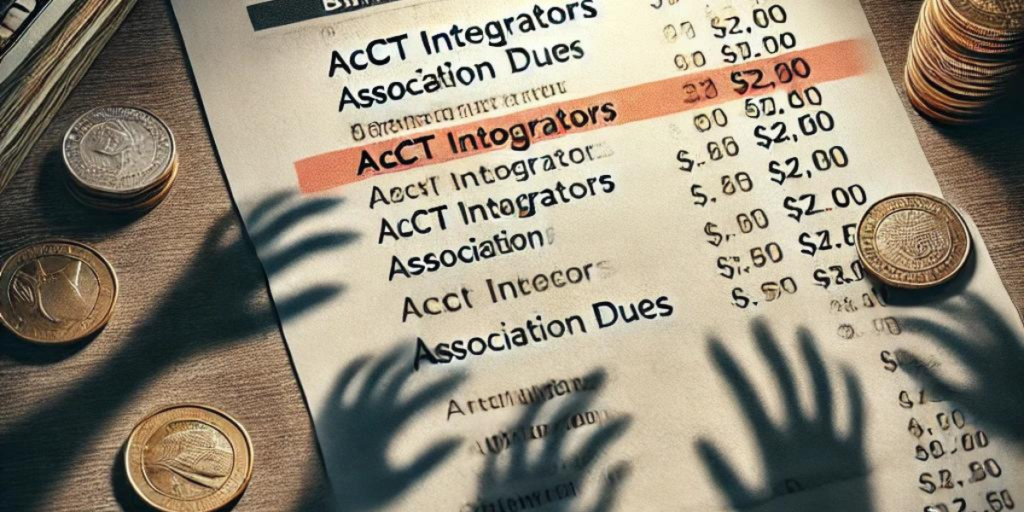In a world where every penny counts, it’s easy to overlook seemingly insignificant charges on your bank statement. But what if those small fees are more than just minor inconveniences? Welcome to the perplexing and often murky waters of association dues — specifically, the ‘Acct Integrators Association Dues.’ These sneaky little charges can add up over time, leaving you wondering where your hard-earned money is disappearing. In this blog post, we’ll uncover the hidden dangers lurking behind these nominal fees and arm you with practical strategies to reclaim control over your finances. Get ready to shine a light on those shadowy charges that might be draining your budget without you even realizing it!
Introduction: The Rise of Small Charges as a Scam Tactic
Have you ever skimmed through your bank statement and stumbled upon a charge that made you raise an eyebrow? The rise of small charges as a scam tactic has become alarmingly prevalent, catching unsuspecting victims off guard. One such dubious entry making waves is the mysterious ‘Acct Integrators Association Dues.’ Many people are left puzzled about what it is—and even more so, why they were charged for it. As scammers get craftier by the day, these seemingly insignificant amounts can lead to significant headaches. Let’s delve deeper into this troubling trend and uncover how to protect yourself from falling victim to these hidden dangers.
What is the Acct Integrators Association?
The Acct Integrators Association is a name that has popped up in various billing statements, often causing confusion among consumers. Many people wonder what this organization really is and why they’re seeing charges associated with it.
In reality, the Acct Integrators Association does not exist in any legitimate capacity. It’s an alias used by scammers to exploit unsuspecting individuals through fraudulent fees. This tactic preys on the assumption that people will ignore small charges.
By using a seemingly official-sounding name, these scammers create an aura of credibility. The goal? To mask their true intentions while testing account information for larger thefts down the line. Awareness of such tactics can help you identify potential scams before they escalate into something far more damaging.
How Scammers Use Small Charges to Test Account Info
Scammers often rely on small charges as a sneaky tactic to test your account information. They know that most people overlook minor deductions, making it the perfect way to probe for vulnerabilities.
These tiny transactions typically range from a few cents to a couple of dollars. The idea is simple: if you don’t notice or dispute these charges quickly enough, they can launch larger fraudulent activities with your financial data.
Once they’ve confirmed access, scammers might escalate their efforts by extracting more significant sums. This strategy plays on human nature; we’re less likely to react strongly over trivial amounts and may mistakenly believe it was an error or misunderstanding.
By masking their intentions behind seemingly harmless fees, fraudsters create a false sense of security while infiltrating your finances unnoticed. Awareness is crucial in identifying these red flags before it’s too late.
Real Life Examples of Victims of the Acct Integrators Association Dues Scam
Many unsuspecting individuals have fallen prey to the Acct Integrators Association dues scam. One victim, Sarah, noticed a small charge of $9.99 on her credit card statement. Initially dismissing it as an error, she later learned it was part of a larger scheme designed to siphon off personal information.
Another case involves Mike, who discovered multiple charges under different names linked to the same fraudulent organization. Each time he tried disputing them, new charges appeared without warning.
Then there’s Lisa, who received an email claiming she owed dues for membership in this nonexistent association. Intrigued but cautious, she nearly provided her banking details before realizing something felt off about the request.
These stories highlight how easily people can be misled by seemingly harmless little charges that mask deeper scams waiting to exploit their trust and financial security.
Steps to Take if You See a Charge from ‘Acct Integrators Association Dues’
If you notice a charge labeled ‘Acct Integrators Association Dues’ on your statement, act promptly. Begin by contacting your bank or credit card company. Inform them about the unfamiliar charge and provide any details they may require.
Next, report the suspicious transaction to the Federal Trade Commission (FTC). This step is crucial in helping authorities track fraudulent activities and protect others from falling victim.
Keep a close eye on all your accounts for any other unusual activity. Scammers often target multiple areas of vulnerability, so vigilance is key.
Document everything related to this charge—dates, amounts, and communications with financial institutions. This information can be invaluable if further action becomes necessary.
- Contact Your Bank or Credit Card Company
If you spot a charge labeled ‘Acct Integrators Association Dues’ on your statement, the first step is to reach out to your bank or credit card company immediately.
These institutions have protocols in place for handling suspicious charges and can provide guidance tailored to your situation. They may ask about recent transactions and help you identify any unauthorized activities linked to your account.
It’s crucial to act quickly. The sooner you report the charge, the better chance you have of disputing it successfully. Your bank might also suggest freezing or monitoring your account as an additional precaution.
Don’t hesitate; make that call right away. Protecting yourself starts with taking proactive steps against potential fraud. Engaging directly with financial professionals can not only resolve issues but also give you peace of mind during such stressful situations.
- Report the Charge to the FTC
If you spot a charge from ‘Acct Integrators Association Dues,’ acting quickly is crucial. One effective step is to report the fraud to the Federal Trade Commission (FTC).
The FTC collects complaints about deceptive or unfair business practices. By reporting your experience, you’re not just protecting yourself; you’re helping others too. The more information they gather, the better equipped they are to tackle these scams.
Filing a complaint is straightforward. You can visit their website and follow the prompts. Provide as much detail as possible about the charge and how it appeared on your statement.
Once submitted, keep an eye out for updates. The FTC may contact you if they need more information or have additional questions regarding your case. Your vigilance contributes to a larger fight against fraudsters targeting unsuspecting consumers with small charges like this one.
- Monitor Your Accounts for Any Other Suspicious Activity
Monitoring your accounts is crucial. Regularly check bank and credit card statements for any unfamiliar transactions. Even small, seemingly innocuous charges can be red flags.
Set up alerts through your banking app to get instant notifications on purchases. This way, you’ll spot unauthorized activity promptly.
Consistency is key; make it a habit to review your financial statements at least once a week. Scammers often test the waters with minor charges before escalating their schemes.
If something doesn’t seem right, act quickly. Contact your financial institution immediately to report suspicious activities. They can guide you on further steps and help protect your assets.
Stay proactive in monitoring not just for scams but also for accidental overdrafts or billing errors that could cost you money over time. Your vigilance plays a significant role in maintaining your financial security against hidden dangers like those associated with ‘acct integrators.’
Prevention: How to Avoid Falling Victim to This Scam in the Future
Regularly checking your financial statements is vital. Set aside time each month to go through transactions. This habit can help you catch small charges like ‘Acct Integrators Association Dues’ before they become a bigger issue.
Stay alert for suspicious emails or phone calls asking for personal information. Scammers often use urgency to trick you into acting quickly without thinking.
Be mindful of the personal details you share online. Limit exposure on social media platforms, as scammers can piece together information from various sources.
Consider using alerts provided by banks and credit card companies. These notifications will inform you about any activity on your accounts, allowing immediate action if something seems off.
Lastly, educate yourself about common scams and tactics used by fraudsters. Awareness is one of the best defenses against falling victim to these schemes in the future.
- Check Your Statements Regularly
Keeping a close eye on your bank and credit card statements can make all the difference. Regularly checking these documents helps you catch any unauthorized charges early.
Set aside time each month for this task. Look through every transaction carefully, not just the larger ones. Small charges like those from “Acct Integrators” can slip under the radar.
If something doesn’t look right, don’t ignore it. Investigate immediately to determine if it’s a legitimate charge or potentially fraudulent activity.
Many banks offer apps that make monitoring easier than ever with real-time alerts for transactions. Take advantage of these tools to stay informed about your financial activities.
By staying proactive in reviewing your statements, you significantly reduce the risk of falling victim to scams tied to hidden charges and keep control over your finances.
- Beware of Suspicious Emails or Phone Calls
Scammers are experts at creating a sense of urgency. You might receive an email or a phone call that claims to be from the Acct Integrators Association. They often use official-looking logos and jargon to appear legitimate.
These communications may ask for sensitive information like your account number or Social Security details. Remember, no reputable organization will request such information via email or phone without prior verification.
Always check the sender’s email address closely. Look for misspellings or inconsistencies in the domain name. A slight variation can signal a scam.
If you receive a suspicious call, hang up immediately and do not provide any personal details. Instead, reach out directly to the institution they claim to represent using verified contact methods.
Your best defense is skepticism; trust your instincts when something feels off.
- Be Wary of Sharing Personal
When it comes to protecting yourself from scams like the ‘Acct Integrators Association Dues,’ sharing personal information can be a double-edged sword. Always think twice before disclosing any details about your finances, especially over the phone or online. Be cautious of unsolicited requests for your private data.
Avoid giving out account numbers, social security numbers, or financial details unless you are absolutely certain about who is asking and why they need that information. It’s best to err on the side of caution; if something seems off, trust your instincts and don’t engage further.
Stay vigilant in today’s digital landscape where scammers are continuously evolving their tactics. By being aware and taking proactive steps to safeguard your personal information, you significantly reduce your chances of falling victim to schemes like this one. Remember, prevention is always better than cure when it comes to fraud protection.






